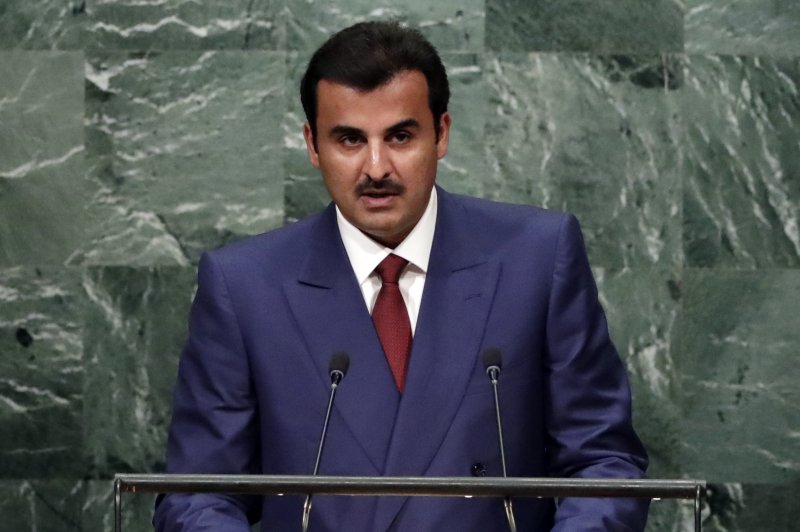Emir of the state of Qatar Sheik Tamim bin Hamad al-Thani addresses the general debate of the 71st Session of the United Nations General Assembly at U.N. headquarters in New York City on September 20. Neighboring Arab nations began an economic and political boycott of Qatar in early June, and Friday presented Qatar with a list of demands to end the crisis. File Photo by Jason Scenes/EPA
June 23 (UPI) -- Qatar received a 13-point list of demands from neighboring Arab nations who cut diplomatic and economic ties earlier this month.
The oil-rich monarchy's relations with Saudi Arabia, Egypt, Bahrain, Kuwait and the United Arab Emirates were cut off in a surprise move earlier this month. The action was led by Qatar's fellow members of the Gulf Cooperation Council, the regionally powerful bloc of oil-producing nations. Qatar was given 10 days to comply with the demands, which include unspecified monetary compensation. Kuwait formally provided Qatar with the list of demands on Friday, the day after Anwar Gargash, UAE foreign affairs minister, announced them. Gargash publicly questioned recent Qatari policies, which included an exchange of hostages in Iraq and Syria that resulted in ransom money later distributed to terrorist groups.
"If Qatar is seeking a separation with its [the Gulf Cooperation Council's] policies, the divorce will happen," Gargash told the newspaper Al-Hayat, Al-Arabiya reported. He added that Qatar, which has the major airport hub in the Gulf region, could find itself ostracized by surrounding countries while engaging in global politics and commerce.
A chastened and weakened Qatar, which has sought to raise its profile on the international stage in recent years, must now either consent to the demands or side more closely with Iran, regarded by Saudi Arabia as a rival for Middle East power, the BBC reported.
The demands include:
-- The closure of several news outlets based in and funded by Qatar, including Al Jazeera
-- Cutting of ties to "terrorist, sectarian and ideological organizations," including the Islamic State, Muslim Brotherhood and Hezbollah
-- An end to funding of terrorist groups, although Qatar has repeatedly denied that it aids terrorist groups
-- The handing over of "terrorist figures," fugitives from the United States and countries involved in the boycott, to their country of origin
-- Qatar must supply data on "opposition members" it has supported
-- A reduction in Qatari-Iranian relations
-- Financial reparations for loss of life caused by recent Qatari policies
-- The closure of a Turkish military base under construction in Qatar
-- Compliance with rules set by the Gulf Cooperation Council, a six-nation bloc of oil-producing Arab states
-- An end to policies regarded as Qatari interference in the accusing countries' internal affairs
-- A military and political alignment with Gulf and Arab countries
-- Consent for a regular audit to determine if the demands are being met
-- And compliance with each of the demands within 10 days
U.S. President Donald Trump has called Qatar a "high-level" sponsor of terrorism in the Middle East, although each of the Arab nations involved is regarded as a U.S. ally. Qatar is also the location of the largest U.S. military base in the Middle East.















